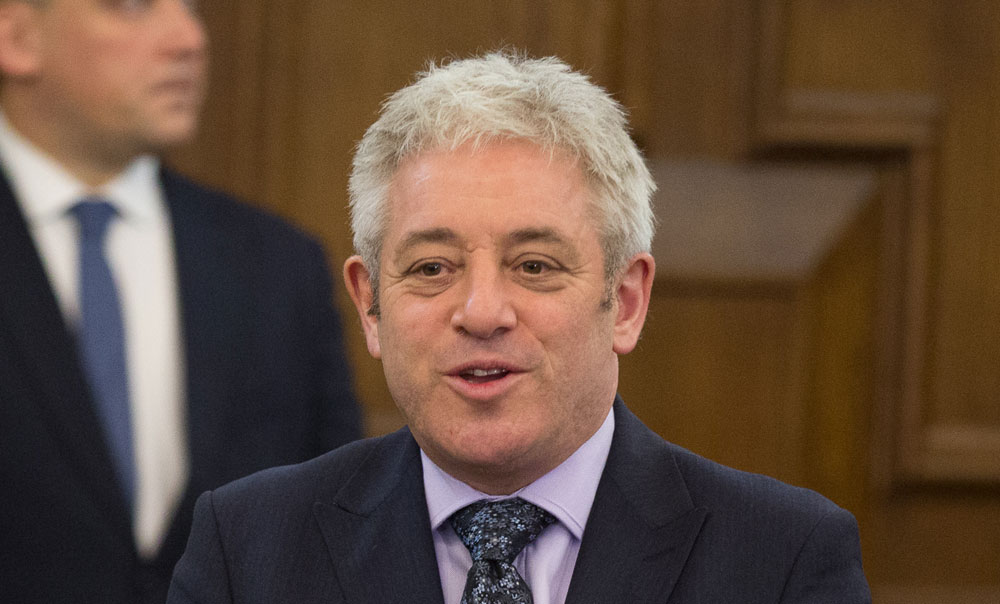The Speaker of the Commons, John Bercow, whose independent spirit has won him a big following among Opposition politicians in India, has stirred up huge controversy by making it clear that Britain’s new Prime Minister should not contemplate forcing through a no-deal Brexit without first getting the consent of Parliament.
Any such notion, he told a widely reported speech in Washington, was “for the birds”.
The number of candidates queuing up to replace Theresa May has now swelled to 11, with several indicating that they would be prepared to take Britain out of the EU without a deal. The suggestion from some that they could use executive authority to force through a no deal Brexit appears to have been torpedoed by Bercow, who is accused by many Tory MPs of having anti-Brexit sympathies.
But equally his willingness not to be cowed by the government has won him many admirers.
He has also enraged the Brexit lobby in Parliament by announcing he has no intention of standing down as Speaker in autumn this year as some had hoped he would do, allowing for the election of a more pliant successor.
Speaking to the Guardian after a speech in Washington, Bercow said: “I’ve never said anything about going in July of this year. Secondly, I do feel that now is a time in which momentous events are taking place and there are great issues to be resolved and in those circumstances, it doesn’t seem to me sensible to vacate the chair.”
He added: “If I had any intention to announce on that matter … I would do so to parliament first.” He told the paper it was not “sensible to vacate the chair” while there were major issues before parliament.
“And, amid growing indications that frontrunners for the Conservative leadership are willing to depart the EU without a deal, he warned candidates not to try to force such an outcome without the permission of MPs.
According to the Guardian, “his comments will be read as a rebuke to the favourites to succeed Theresa May, including Boris Johnson, who have said that the UK must leave the EU on 31 October no matter what. They suggest he will stay on to see through the parliamentary battle likely to emerge in the coming months, as a cross-party group of MPs gear up to prevent the new Conservative Prime Minister trying to force through a no-deal Brexit.”
In a “forthright” speech at the Brookings Institution, Bercow said it was “for the birds” to think that parliament could be sidelined in the debate over Brexit. But he added: “The idea that parliament is going to... be evacuated from the centre-stage of the debate on Brexit is unimaginable.” MPs have already voted against leaving the EU without a deal at the end of March, but some of the Conservative leadership candidates — Johnson, Dominic Raab and Esther McVey — have said they would be prepared to leave the EU, deal or no deal, at the end of October.
Raab, a former Brexit secretary, even suggested he would be ready to ignore the will of parliament in order to do so, telling BBC One’s The Andrew Marr Show: “It’s very difficult for Parliament now to legislate against a no deal, or in favour of a further extension, unless a resolute Prime Minister is willing to acquiesce in that — and I would not.”
Pro-remain MPs are worried they may have run out of mechanisms to prevent a no-deal Brexit, and the Institute for Government has said there may be no decisive route left for Parliament to block a no deal.
“However, there is the potential for an engaged Speaker to grant emergency motions or be more flexible in his interpretation of parliamentary convention to create opportunities for MPs to have their say,” the Guardian reported.
While many Conservatives view Bercow’s claims of neutrality with scepticism, he insisted to a mostly academic audience at the Brookings Institution on Tuesday that he was simply a fierce defender of parliament’s rights.
He said: “My reading of the situation is that legally, the default position in the absence of an agreement …… is Brexit on 31 October – that is to say in the absence of a deal and in the absence of a further extension. That is the legal position as I understand it.”
But he added: “There is a difference between a legal default position and what the interplay of political forces in parliament will facilitate.” He said he would like to be remembered “as a backbenchers’ champion”.










